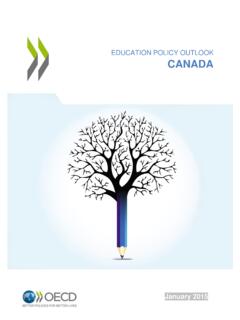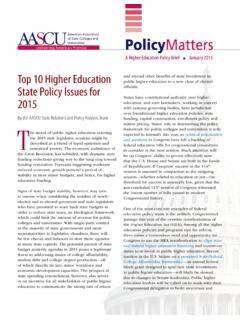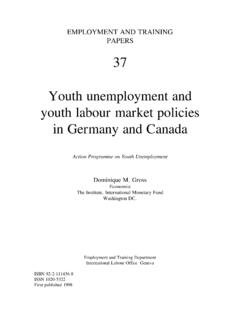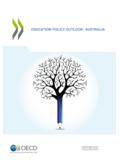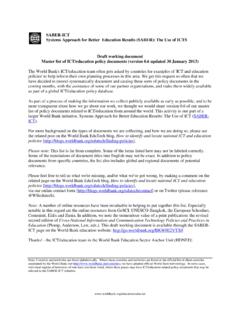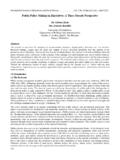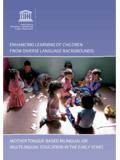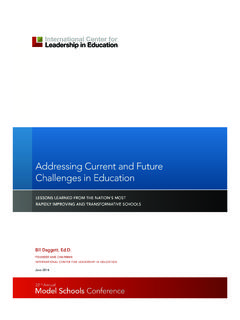Transcription of A European and Swedish perspective on ICT – policies and ...
1 A European and Swedish perspective on ICT policies and strategies in education National and institutional pathways: crossings, blind alleys and uphill slopes Henrik HANSSON. Institute of International education , Stockholm University Stockholm, 106 91, Sweden Carl HOLMBERG. Swedish Agency for Flexible Learning 281 31 H ssleholm, Sweden Abstract This paper aims at answering the following questions: the aforementioned countries. Their results are therefore 1. What general goals do politicians in Europe express in not easily transferred to other political, economic and national policy documents for the integration of cultural contexts. Also the international discourse in this information and communication technology (ICT) in their area is mainly taking place in non - European and non - education systems?
2 To develop that theme further we Nordic specialised journals. explored the situation in our own country Sweden as a case. 2. What policies and strategies for ICT in education One major difference between Sweden and United States do leaders of Swedish higher education institutions is the way higher education is financed. An important develop? 3. How do Swedish national priorities and source of income in the case is tuition fees. The academic institutional interests match? universities in Sweden are not allowed to receive The globalisation of education forces different value payment from students for the provision of higher systems to meet. There is on the national level highly education . Tertiary education in Sweden is financed by different political values on what kind of education public means.
3 The reason for Swedish universities to go system to prefer the Scandinavian model and the online and educate foreign students for free is thus very American model are two extremes. There are also very limited. Therefore Swedish universities have not been different values inherent in higher education institutions, active in the international internet based education the academia, - compared with the values and visions business. On the other hand in the Swedish context it is held by the political leaders. These value differences hard for international competitors to compete because the between and within countries are elaborated and national system offers the services for free and it also discussed. A Swedish , Scandinavian and European provides higher education in the native language, perspective is adopted, but a wider international outlook Swedish .
4 The international competition to recruit students is also given. It is suggested that the value conflicts, has in Sweden therefore been very low or non-existent in often not explicit, understood or recognised, are one of comparison with the situation between the Anglo-Saxon the major inhibitors for systemic change. The direction of (US, UK, Australia and Canada) global actors on other change cannot be taken for granted the driving forces markets. pull in opposing directions. Different visions of the future struggle to be fulfilled. Educational policies in Sweden have been seen as a national domain by the politicians, but the political Keywords: ICT in education , policy , National political control of the increasingly international and money interests, Academic strategies , Value conflicts, driven internet based education cannot be ignored.
5 Promoting/Hindering factors, Europe, Scandinavia, Reluctantly the globalisation of education is Sweden, Globalisation. acknowledged. It also gives some future promises for the not enough funded tertiary sector in Sweden. There is abundant literature about globalisation and how to understand it - its background, forces, current situation Introduction and Aim and future scenarios. A comprehensive book dealing with these issues is The Globalisation of World Politics . edited by Baylis and Smith [5]. The study of e-learning strategies on national and institutional levels has mainly been focusing the English speaking countries: United States, United Kingdom, There are many political, historical and cultural similarities between the Scandinavian countries: Australia, and Canada.
6 Tony Bates [1] [2] and Michael Denmark, Finland, Norway and Sweden, it makes sense Moore [3] [4] are prominent researchers in this field, but to talk about a Scandinavian perspective on higher the examples and analysis they do are mainly drawn from education and its relation to e-learning. There are also 86 SYSTEMICS, CYBERNETICS AND INFORMATICS VOLUME 2 - NUMBER 2. some important differences. Finland has been the most Study 2: National policy and Institutional internationally active country in e-learning and internet based education . Sweden has had a more inward looking compliance - Swedish case attitude first develop domestically and then create A second study was done in Sweden with the aim of international networks and do international outlooks has studying the compliance of higher education institutions been the political standpoint.
7 The related concept in relation to the national policies . Our questions Distance education has never been understood in therefore were How is policy received? What actions are Denmark, since distances are short, but Norway and taken to realise policy ? The institutional policy Sweden, being sparsely populated widespread countries, documents and other related documents for policy have a more than 100 year tradition of providing distance development was interpreted. How do higher education education before the advent of internet [6] [7]. institutions respond to the political demand of providing flexible higher education using ICT? What institutional In Denmark the public financing for e-learning students rationale can be deduced from the documents?
8 In other are only 50 % of the funding provided for a campus words how can the decisions of the institutions be student. The reasons for that is that no physical facilities: understood as rational choices taking their perspective ? university buildings, classrooms etc are needed in the case of e-learning. In Sweden the implementation scenario is totally different. In order to stimulate a slow Methods changing system and to support the costly build up of services the public funding for an e-learning student have presently been set to almost the double amount of money Study 1: National policies compared to a campus student. Data gathering Three ways of identifying the relevant national Sweden has invested large amounts of money for documents was tested, and evaluated: development work from the state directly to education 1.
9 Technical navigation through internet institutions, but not allocated resources for follow up and search engines automatically . research in this field to any significant degree. Denmark 2. Social navigation by asking key persons has a stronger research focus and Finland has developed in selected countries about core documents strong ties between the business sector and the 3. Using internationally available documents with universities. The Finnish book The Challenges of ICT in descriptive data for further analysis Finnish education [8] spells out the Finnish perspective prior to the start of the Finnish Virtual University. The results of the three methods are discussed below and arguments for the selection of one of these approaches In the EU-funded project E-watch a report was produced are given.
10 About current ICT- policies for education in Europe [9]. That study was based on pre- defined categories for Data analysis analysis. The present study however adopts an Two ways of analysis was used to advance understanding interpretive approach creating categories that of the descriptive data: summaries the content in policies using a grounded 1. Deductive analysis. Using the categories theory method and a qualitative research design [10] [11, developed by the e-watch group before 12] [13, 14]. studying the quality of the documents and their content. The pre defined categories where: a). The policy analysis literature consists mainly of literature content development b) infrastructure and concerning analysis for policy development (how to access c) teacher and pupils learning develop policies ), but our interest here is the analysis of development d) partnerships e) other aspects policy documents (how to understand existing policies ).



